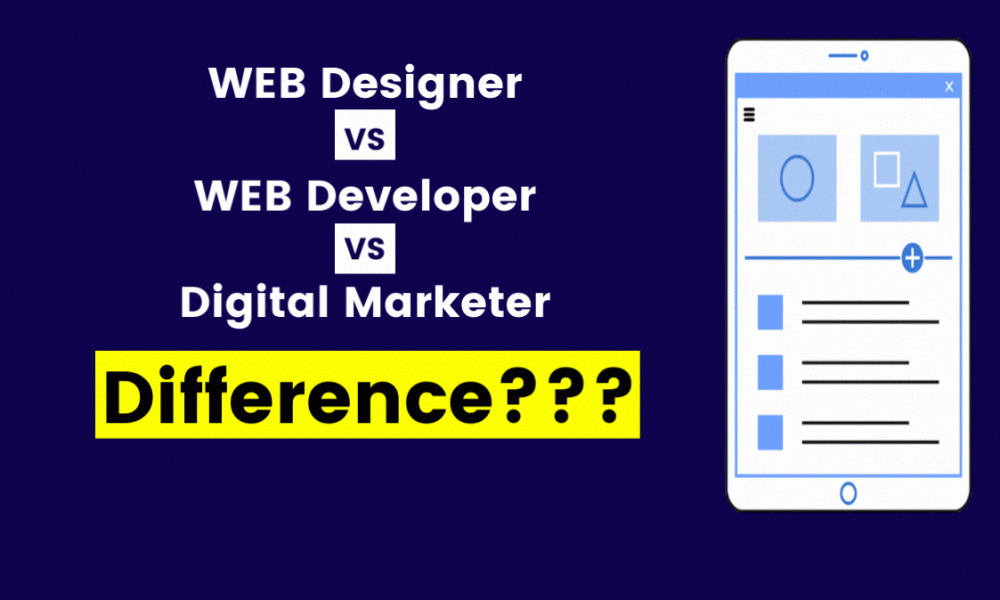Just in case if you want to refresh or develop a website from the very start, it is pretty much understood that you want that particular website to portray your brand, communicate your value proposition, and most importantly attract your target audience. That is why, the very first thing that you should think about is the custom web development, which can be an easy task to accomplish as anyone in your social circle can easily handle that for you.
However, that being said it is also true that a good web professional won’t be doing websites as a side gig and would instead do it as a professional.
Which Web Professional Do You Need?
The very first question that boggles the mind all of a sudden when we talk about creating a website is the kind of professional we need i.e. a web designer, web developer, or a digital marketer? And for that, you must keep this in mind that all the three differ and that is why, you must figure out their key differences prior to losing your money while finally ending up with a still digital brochure that will lie dormant or a an endless digital phenomenon that can ideally drive your business for the upcoming years.
That is why utmost care is needed prior to initiating your project, comprehending the limitations as well as capabilities of the person that you’re going to hire.
What Does a Web Designer Do?

It goes without saying that a visually unattractive or hard to navigate website is fair enough reason to forbade a potential buyer from keeping up with your brand. However, it is to be kept in mind that web design isn’t only about the outlook of a website. Instead, it must keep into consideration the target audience, the buyer’s journey online, and most importantly the final goal of the site.
If you are going to hire the best web designer, you are not only going to exhibit your product but also brand or service and they’ll also conveniently develop an appropriate way for right conversion to sales.
Here are certain areas of specialty within the web design space:
1. User Experience (UX) Designing
A UX designer creates an online customer journey and will tailor a website to your target audience using detailed research undertaken into your users’ demographics and needs. It’s important to focus on the UX when it comes to enhancing your conversion rate.
If users enjoy browsing through your website, they would be more inclined to come back to your web page or want to recommend it to others. That is why you can understand how special user experience is for your users.
2. User Interface (UI) Designing
A UI designer optimizes it easily and how users can easily engage with your website while also usually through a firm comprehension of your brand and values.
Although this may look a bit confusing to a UX designer, a UI designer can make the most of the look and also feel of a design instead of the whole user experience of the interface.
3. Visual Designer
As far as a visual designer is concerned, he/she wears both the UX and UI hats to establish a user journey that truly values experience and also design.
Web designers could easily make the most of programs such as Adobe InDesign or Photoshop to establish the visual elements of the website and also to easily develop information architecture, which are then easily incorporated into the end coding taken on by a web developer.
These days, folks are usually going online to keep up with a brand, not just transact. That is why; the right web design can easily be enhanced by an effective digital marketing strategy to easily convert casual browsers into clients.
What Does a Web Developer Do?

We’ve all experienced the real frustration of a handsome website that can take ages to load and this can land your brand in trouble, and bring horrible consequences for business. A brilliant website should not only have a sleek appearance, but it must also be reliable as well as functional. Here is where the role of a web developer comes into play.
As in the case of web design, there are several kinds of specialties within the web development field as well:
1. Back-end Development
A website back-end developer’s job is to create and maintain the basic programming of a website. Their performance often remains unnoticed but is really essential for the creation of a full-fledged functional website.
The main job of a back-end developer is to make sure that all the data and processes demanded by the front-end interface or application are easily performed through programmatic means.
Moreover, back-end developers are also fully in control of setting up the whole website database, logic system, data and application integration that also includes content management systems. In addition, a back-end developer also easily carries out the testing and debugging of any kind of back-end problems. It won’t be an overestimation to say this crucial role plays a crucial part in website development and its basic operations.
2. Full-stack Development
A full-stack developer can easily work on not only the back-end but also front-end of a website as they are behind the programming of your whole user experience within a website.
Once a developer is done with the structure of a website with the help of coding, a CMS such as WordPress, Magento or Shopify can be easily utilized to let clients to conveniently review and update their own websites.
A website such as a business must be distinguished. A good web developer will obviously adopt a tailored approach, and coordinate with you to easily learn about your business objectives and easily identify an ideal CMS platform.
3. Front-end Development
As the name reveals, the basic job of a front-end developer is to create the user-facing parts of a website. You might have heard of HTML, JavaScript or CSS and you should know that all these are programming languages that front-end developers make the most of to convert the vision of a web design.
While making the most of these language tools, front-end developers work in close coordination with user interface designers to come up with design concepts or wireframes to digital life.
The pretty exceptional thing about skilled front-end developers is that they can also state issues in the user experience while offering recommendations to easily influence a specific design. It’s also crucial to be capable of carefully putting these ideas forward to some other key web departments in order to mention particular goals and needs that are met when executing.
What Does a Digital Marketer Do?

The basic job of a Digital Marketer is to make the most of digital channels to successfully reach customers, easily build brand awareness, and also boost products and services.
Owing to the unique combo of planning, creativity, and also strategy, the role that Digital or Web Marketers play is very diverse. Besides, they also master a wide array of skills as well as tools to stay updated with top of the fastest flourishing digital media channels they make the most of to create, deploy, manage, as well as track campaigns.
To put it more precisely, a Digital Marketer is responsible for the following functions.
1. Social Media Marketing
The strategic formation as well as placement of local content that boosts your product or brand through your business’s own Instagram, Twitter, Facebook, and LinkedIn platforms and also the posts you usually pay to pop up appear on other individual’s channels.
2. Email Marketing
This is definitely the most obvious way to take care of relationships with your current customers, keep them in touch with updates, and enhance their level of engagement with your brand while also reaching prospective clients with the most effectively targeted and low-cost campaign.
3. Inbound Marketing
This is anything to do that involves your company website’s ability to attract, engage, and convert users. Typically, this involves filling your site with the kind of interesting and useful content—thought leadership articles, helpful blog posts, and several other things to successfully appeal to the audience that you want to attract. These should be considerably envisaged and written to either successfully rank highly for frequently searched queries or have an attractive enough hook that your audience will definitely share them through some other channels.
4. Pay-per-Click ads
The straight approach, just paying for ads, makes sure that you’ll get more potential customers right on your brand or website. Although simple in concept, complex in execution: usually given the right investment of real dollars, PPC advertising easily needs a cautiously thought-out strategy to make sure your ads are only being placed where they’ll be most efficient.
5. Reporting and Analytics
The most important part is the one in which all of the aforementioned strategies need post-mortem analysis to easily comprehend as to what worked and what was spent extra on time and money. Besides, it’s also now possible to easily get highly thorough breakdowns of where from your digital traffic comes and also as to where it goes, which keywords or images are the most efficient at catching clicks, and so on.
Sorting through this mountain of information ensures that each digital marketing campaign learns from the shortcomings of the one before, to better target the correct audience moving forward.
While keeping in view the fact that strategies thoroughly exist in separation from the others, highly efficient Digital Marketers analyze the success of every of these channels to make sure they’re usually working in close connection with one another and with any kind of traditional marketing channels the brand is also investing in. Some of them also include print ads as well as PR campaigns, and also loyalty programs to thoroughly advance the company’s goals.
Moreover, the Digital Marketer also makes the most of some tools such as Google Analytics, Ahrefs, Facebook Ads Manager, Zapier, Mailchimp as well as Salesforce and all of them represent just a little fraction of the huge assortment of tools developed to make things even more convenient.

Leave a Reply